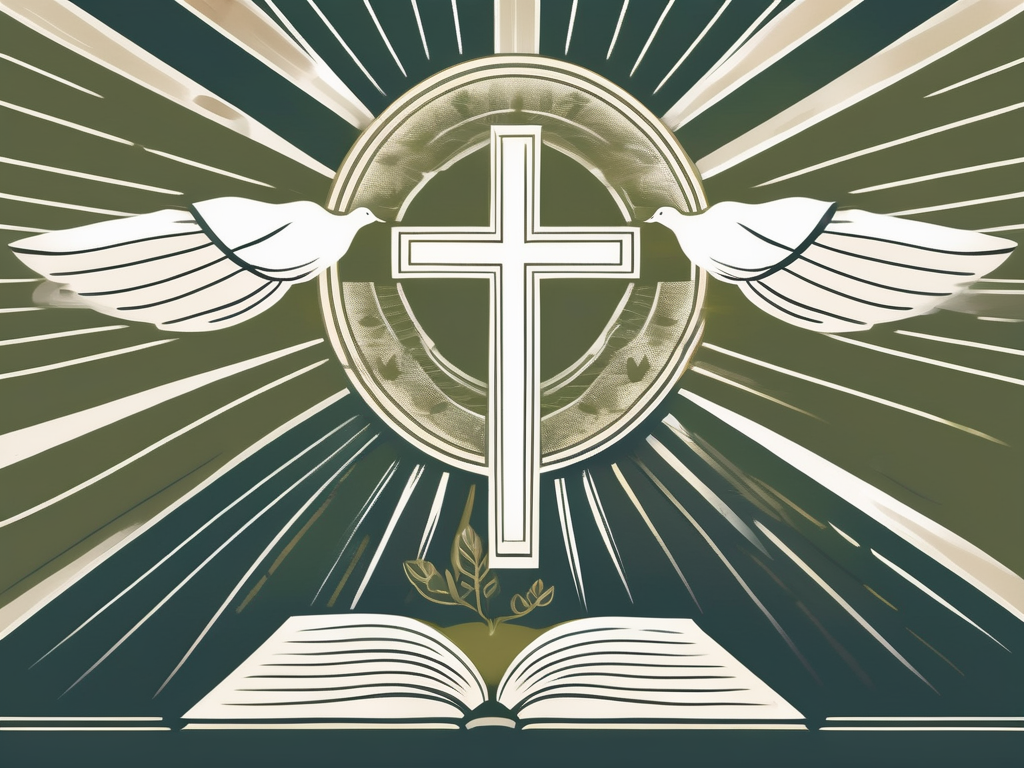Martyrdom has always been a central theme in religious narratives, and the Bible is no exception. The stories of individuals willing to sacrifice their lives for their faith are captivating and inspiring, shedding light on the courage and conviction that define true believers. In this article, we will explore the concept of martyrdom within the biblical context, with a particular focus on the figure of the first martyr.
Understanding Martyrdom in Biblical Context
The Concept of Martyrdom
The term “martyr” originates from the Greek word “martys,” meaning witness. In biblical terms, a martyr is someone who bears witness to their faith by undergoing persecution, suffering, and even death. By willingly sacrificing their lives, martyrs testify to the truth of their beliefs and inspire others to stand firm in their convictions.
Martyrdom is a concept deeply rooted in the history of religious devotion. Throughout the ages, individuals from various faith traditions have embraced martyrdom as a means of expressing their unwavering commitment to their beliefs. The act of martyrdom, although often associated with Christianity, can be found in other religious texts and traditions as well.
In the Bible, martyrdom is not simply an act of self-sacrifice; it is a powerful symbol of faith and a testament to the strength of one’s convictions. The stories of martyrs in the Old and New Testaments serve as a source of inspiration and guidance for believers, reminding them of the profound impact that a steadfast commitment to one’s faith can have.
Martyrdom in the Old Testament
Martyrdom finds its roots in the Old Testament, where several figures exemplify unwavering faith even in the face of extreme adversity. One such example is the story of the prophet Daniel, who refused to worship false idols and was sentenced to be tossed into a den of hungry lions. Despite the impending danger, Daniel’s steadfast trust in God’s protection ultimately spared him from harm.
The story of Daniel serves as a powerful reminder of the strength that can be found in unwavering faith. It teaches believers that even in the most dire circumstances, God’s providence can prevail and protect those who remain steadfast in their devotion.
Another notable example is the story of the Maccabean martyrs, who rebelled against the oppressive rule of Antiochus IV. These brave individuals would rather die than renounce their Jewish faith or conform to Hellenistic practices. Their heroic acts continue to serve as a symbol of resistance and dedication for generations to come.
The Maccabean martyrs’ unwavering commitment to their faith in the face of persecution is a testament to the power of religious conviction. Their sacrifice serves as a reminder that sometimes, the greatest act of faith is to stand firm in the face of adversity, even if it means paying the ultimate price.
Martyrdom in the New Testament
The New Testament presents an even more profound perspective on martyrdom. The pinnacle of these narratives is undoubtedly the story of Jesus Christ. Though often referred to as the ultimate martyr, Jesus’ sacrifice goes beyond mere martyrdom. His crucifixion and subsequent resurrection hold the key to salvation for Christians worldwide.
Jesus’ willingness to lay down his life for the sake of humanity is a demonstration of unparalleled love and selflessness. His sacrifice serves as the foundation of the Christian faith, offering believers the hope of eternal life and redemption.
Additionally, the apostles and early followers of Jesus faced severe persecution and martyrdom for their belief in Him. Stonings, crucifixions, and other cruelties were inflicted upon them, yet their unyielding commitment to spreading the Gospel and standing firm in their faith served as a powerful testament to the truth of Christ’s teachings.
The martyrdom of the apostles and early Christians is a testament to the transformative power of faith. Despite the immense suffering they endured, they remained steadfast in their devotion to Jesus and the message of salvation. Their martyrdom serves as a reminder that the path to spiritual enlightenment is often paved with sacrifice and perseverance.
The First Martyr: A Closer Look
The Life of the First Martyr
The first martyr mentioned in the Bible is Stephen, whose story is found in the book of Acts. Stephen was chosen as one of the first deacons in the early Christian community and quickly became known for his wisdom and ability to perform miracles. However, his outspokenness and unwavering commitment to the Gospel caused him to face opposition.
Stephen’s unwavering faith eventually led him to a confrontation with the Sanhedrin, the Jewish religious council. In a powerful defense of Jesus and His teachings, Stephen accused the council of betraying God’s plan for salvation through their rejection of the Messiah. His words sparked anger and indignation among the religious leaders, leading to his unjust execution by stoning.
But let’s delve deeper into Stephen’s life and the impact he had on the early Christian community. Born into a devout Jewish family, Stephen grew up immersed in the teachings of the Torah. He was known for his exceptional knowledge of the scriptures and his ability to eloquently explain their meaning to others. This made him a natural choice for the role of a deacon, as he possessed both the spiritual wisdom and the practical skills necessary to serve the growing Christian community.
Stephen’s reputation as a miracle worker spread quickly, and people from all walks of life sought his guidance and prayers. He would often spend hours in prayer, seeking God’s wisdom and guidance for the challenges he faced. It was during one of these moments of deep communion with God that Stephen received a vision of Jesus standing at the right hand of God, confirming his faith and strengthening his resolve to proclaim the Gospel fearlessly.
The Sacrifice and its Significance
Stephen’s martyrdom holds significant meaning for the early Christian community and beyond. His willingness to face death rather than renounce his faith in Jesus Christ serves as a powerful example of steadfast devotion and resolve. It highlights the importance of standing firm in one’s beliefs, even in the face of immense opposition.
But let’s explore the impact of Stephen’s sacrifice on the early Christian community. His martyrdom ignited a wave of persecution against the followers of Jesus, as the religious leaders sought to suppress the growing influence of Christianity. This persecution, although brutal and unjust, only served to strengthen the resolve of the early Christians, who saw in Stephen’s death a confirmation of their faith.
The story of Stephen also offers a glimpse into the early conflicts between Judaism and Christianity. His stoning marks a turning point, signifying the growing hostility towards the followers of Jesus within the Jewish religious establishment. Stephen’s martyrdom contributes to the understanding of the historical context surrounding the birth and early development of Christianity.
Furthermore, Stephen’s death had a profound impact on the conversion of Saul of Tarsus, who would later become the apostle Paul. As Saul stood by, consenting to Stephen’s execution, he witnessed the unwavering faith and forgiveness displayed by Stephen in his final moments. This encounter with Stephen’s martyrdom planted a seed of doubt in Saul’s heart, eventually leading to his own conversion and transformation into one of the most influential figures in the early Christian movement.
In conclusion, the story of Stephen, the first martyr, is a testament to the power of faith and the courage to stand up for one’s beliefs. His unwavering commitment to the Gospel and his ultimate sacrifice continue to inspire and challenge Christians today. Stephen’s story serves as a reminder that even in the face of persecution and opposition, the message of Jesus Christ and the hope of salvation will prevail.
The Impact of the First Martyr on Early Christianity
Influence on Beliefs and Practices
The martyrdom of Stephen had a profound impact on the emerging Christian community. It solidified the belief that true faith may require ultimate sacrifice, reinforcing the commitment of believers to their convictions. Stephen’s martyrdom also played a significant role in shaping the early Christian understanding of persecution and suffering as a means of identification with Jesus’ own sacrificial death.
Stephen, a man known for his unwavering faith and dedication to spreading the Gospel, faced a hostile crowd who ultimately stoned him to death. His martyrdom served as a powerful example to early Christians, illustrating the lengths one may have to go in order to remain faithful to their beliefs. The story of Stephen’s martyrdom became a source of inspiration and encouragement for believers who faced persecution in the years to come.
Furthermore, Stephen’s death spurred the dispersion of early Christians, leading to the spread of the Gospel beyond Jerusalem. As persecution intensified, believers were scattered throughout various regions, effectively carrying the message of Christ far and wide. These scattered communities of believers became beacons of hope in the midst of adversity, sharing the teachings of Jesus and establishing new centers of worship.
Amidst the challenges they faced, the early Christians found solace in the example set by Stephen. His martyrdom reminded them that their faith was not in vain and that their suffering had a purpose. It strengthened their resolve to continue spreading the message of salvation, even in the face of intense opposition.
Shaping the Christian Narrative
The story of the first martyr played a pivotal role in the shaping of the Christian narrative. Stephen’s selfless sacrifice and unwavering dedication became a symbol of Christian heroism and provided a powerful example for subsequent generations of believers.
Stephen’s martyrdom became a defining moment in the early Christian community, serving as a catalyst for the growth and endurance of the faith. His courage and steadfastness in the face of persecution inspired countless others to follow in his footsteps, willingly facing persecution and death for the sake of the Gospel.
Martyrdom became a central theme in Christian theology, with countless individuals willingly facing persecution and death for the sake of their faith. Their stories serve as a powerful reminder of the transformative power of faith and the enduring legacy of those who are willing to lay down their lives for their beliefs.
Stephen’s martyrdom also had a lasting impact on the understanding of suffering within the Christian tradition. It taught early believers that suffering was not meaningless, but rather a way to identify with Jesus’ own sacrificial death. This understanding of suffering as a means of union with Christ became a cornerstone of Christian theology, providing comfort and meaning to those who faced persecution.
As the Christian community grew and spread, the stories of martyrs like Stephen became woven into the fabric of the faith. Their testimonies of unwavering faith and sacrificial love continue to inspire and challenge believers today, reminding them of the cost of discipleship and the power of a life fully surrendered to God.
The First Martyr in Modern Interpretations
The First Martyr in Art and Literature
Throughout history, the story of the first martyr has captured the imagination of artists and writers, inspiring countless interpretations across various mediums. Paintings, statues, and literature depicting Stephen’s martyrdom often aim to evoke both sympathy and admiration for his heroic struggle.
These artistic representations serve as a visual reminder of the sacrifice and courage demonstrated by Stephen, reinforcing the enduring power of his story and its impact on Christian thought and culture.
Contemporary Views on the First Martyr
Today, the story of the first martyr continues to resonate with believers and scholars alike. It prompts questions regarding faith, sacrifice, and the enduring relevance of ancient narratives.
Many theologians view Stephen’s martyrdom as a significant moment in the early development of the Christian faith, highlighting the unwavering commitment that defines true discipleship. His example challenges believers to remain steadfast in their convictions while confronting the obstacles and opposition that may arise in their journey of faith.
Theological Perspectives on the First Martyr
The Martyr’s Role in Salvation History
From a theological standpoint, the first martyr has a profound significance in the broader narrative of salvation history. Stephen’s sacrifice, like that of Jesus, points to the redemptive nature of suffering and death. It serves as a reminder that through sacrifice and selflessness, believers can attain spiritual transformation and participate in God’s plan of salvation.
The First Martyr and the Problem of Evil
Stephen’s martyrdom also raises questions about the existence of evil and the role it plays in the lives of believers. The unjust persecution and subsequent death of an innocent man serve as a reminder that suffering is an unavoidable reality in a broken world.
Yet, Stephen’s steadfast faith and the ultimate victory of Jesus over death offer hope and reassurance, suggesting that even in the face of evil and suffering, God’s redemptive plan will ultimately prevail.
In conclusion, the story of the first martyr, Stephen, unveils a crucial chapter in the Bible’s narrative. His heroic sacrifice embodies the unwavering commitment and resilience that define true faith. From its roots in the Old Testament to its pivotal role in the development of early Christianity, martyrdom continues to shape religious beliefs and practices. Stephen’s story also offers inspiration for modern interpretations in art, literature, and theological discourse. Ultimately, the first martyr’s unwavering devotion challenges believers to live out their faith with courage and conviction, even in the face of persecution and suffering.












